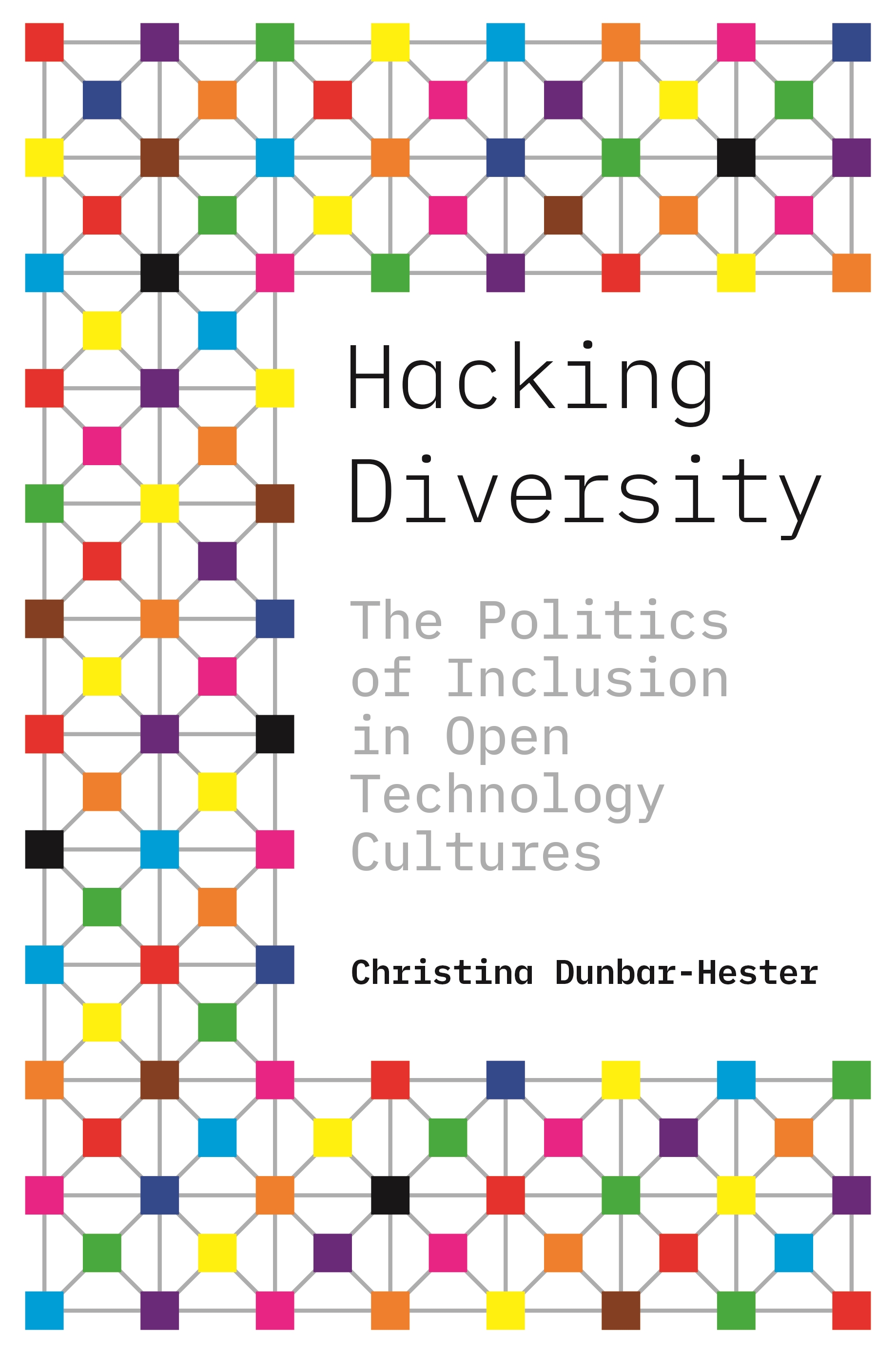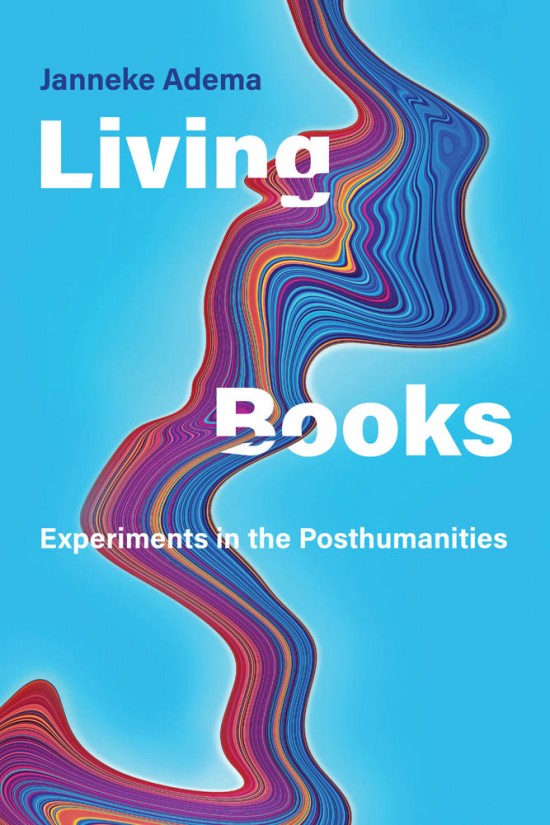Christina Dunbar-Hester: Hacking Diversity: The Politics of Inclusion in Open Technology Cultures (2020)
Filed under book | Tags: · care, community, computing, diversity, diy, ethnicity, feminism, floss, gender, hacker culture, hackerspace, hacking, identity, open source, openness, participation, politics, queer, race, technology, women

“A firsthand look at efforts to improve diversity in software and hackerspace communities.
Hacking, as a mode of technical and cultural production, is commonly celebrated for its extraordinary freedoms of creation and circulation. Yet surprisingly few women participate in it: rates of involvement by technologically skilled women are drastically lower in hacking communities than in industry and academia. Hacking Diversity investigates the activists engaged in free and open-source software to understand why, despite their efforts, they fail to achieve the diversity that their ideals support.
Christina Dunbar-Hester shows that within this well-meaning volunteer world, beyond the sway of human resource departments and equal opportunity legislation, members of underrepresented groups face unique challenges. She brings together more than five years of firsthand research: attending software conferences and training events, working on message boards and listservs, and frequenting North American hackerspaces. She explores who participates in voluntaristic technology cultures, to what ends, and with what consequences. Digging deep into the fundamental assumptions underpinning STEM-oriented societies, Dunbar-Hester demonstrates that while the preferred solutions of tech enthusiasts—their “hacks” of projects and cultures—can ameliorate some of the “bugs” within their own communities, these methods come up short for issues of unequal social and economic power. Distributing “diversity” in technical production is not equal to generating justice.
Hacking Diversity reframes questions of diversity advocacy to consider what interventions might appropriately broaden inclusion and participation in the hacking world and beyond.”
Publisher Princeton University Press, 2020
Princeton Studies in Culture and Technology series
ISBN 9780691182070, 0691182078
xi+271 pages
Reviews: Jenna P. Carpenter (Tech & Society, 2021), Rebecca Ortenberg (Lady Science, 2020), Samantha Shorey (International Journal of Communication, 2020).
EPUB (updated on 2022-8-29)
PDF (added on 2022-12-12)
Janneke Adema: Living Books: Experiments in the Posthumanities (2021)
Filed under book | Tags: · archive, authorship, book, collaboration, community, copyright, hypertext, media, neoliberalism, open access, openness, print, publishing, scholarship, university, versioning, wiki

“Reimagining the scholarly book as living and collaborative—not as commodified and essentialized, but in all its dynamic materiality.
In this book, Janneke Adema proposes that we reimagine the scholarly book as a living and collaborative project—not as linear, bound, and fixed, but as fluid, remixed, and liquid, a space for experimentation. She presents a series of cutting-edge experiments in arts and humanities book publishing, showcasing the radical new forms that book-based scholarly work might take in the digital age. Adema’s proposed alternative futures for the scholarly book go beyond such print-based assumptions as fixity, stability, the single author, originality, and copyright, reaching instead for a dynamic and emergent materiality.
Adema suggests ways to unbind the book, describing experiments in scholarly book publishing with new forms of anonymous collaborative authorship, radical open access publishing, and processual, living, and remixed publications, among other practices. She doesn’t cast digital as the solution and print as the problem; the problem in scholarly publishing, she argues, is not print itself, but the way print has been commodified and essentialized. Adema explores alternative, more ethical models of authorship; constructs an alternative genealogy of openness; and examines opportunities for intervention in current cultures of knowledge production. Finally, asking why it is that we cut and bind our research together at all, she examines two book publishing projects that experiment with remix and reuse and try to rethink and reperform the book-apparatus by taking responsibility for the cuts they make.”
Publisher MIT Press, August 2021
Leonardo series
Creative Commons BY-NC 4.0 International License
ISBN 9780262046022, 0262046024
xiii+335 pages
Interview with author: Erzsébet Tóth-Czifra (Dariah Open, 2021).
Comment (0)Peter Jakobsson: Öppenhetsindustrin / Openness Industry (2012) [Swedish]
Filed under thesis | Tags: · business, copyright, creative industries, crowdsourcing, governmentality, ideology, internet, media industry, openness, openness industry
“Over recent decades several competing descriptions of the media and cultural industries have been put forward. The media and cultural industries have been described as creative industries, copyright industries, and as constitutive of an experience economy. One key element in these descriptions has been the importance of copyright law in a postindustrial economy.
The present study is an analysis of an emerging idea of an industry that functions, in part, outside of the market created by copyright law, and by exploiting, or by building markets on top of, digital, cultural and informational commons. The study is about how this idea is expressed in various forms by business organisations, companies, consultants and policymakers. I have invented the concept of the openness industry to denote the businesses that these organisations and policy makers claim are forerunners and promoters of the idea of ‘openness’ as a business model for the media industry. The purpose of the thesis is to analyse the governmentality and ideology of the openness industry.
A key element in the idea of the openness industry is that internet users can be persuaded to produce symbolic products for it by other means than the economic incentives provided by copyright. Another key element is the high value placed on single individuals in the creation of economic value; but in contrast to how the copyright industries are thought to be dependent on ‘authors’, the openness industry relies on the ‘entrepreneur’. Previous notions of the media and cultural industries have given publishers and producers of film, music and games a central role.The companies that are seminal to the idea of the openness industry are internet and technology companies.” (Abstract)
Doctoral thesis
Media and Communication, Örebro University, Sweden, 2012
Supervisors: Göran Bolin, Mats Ekström
ISBN 9789176688533
209 pages
commentary (Jonas Andersson, in Swedish)
Comment (0)
